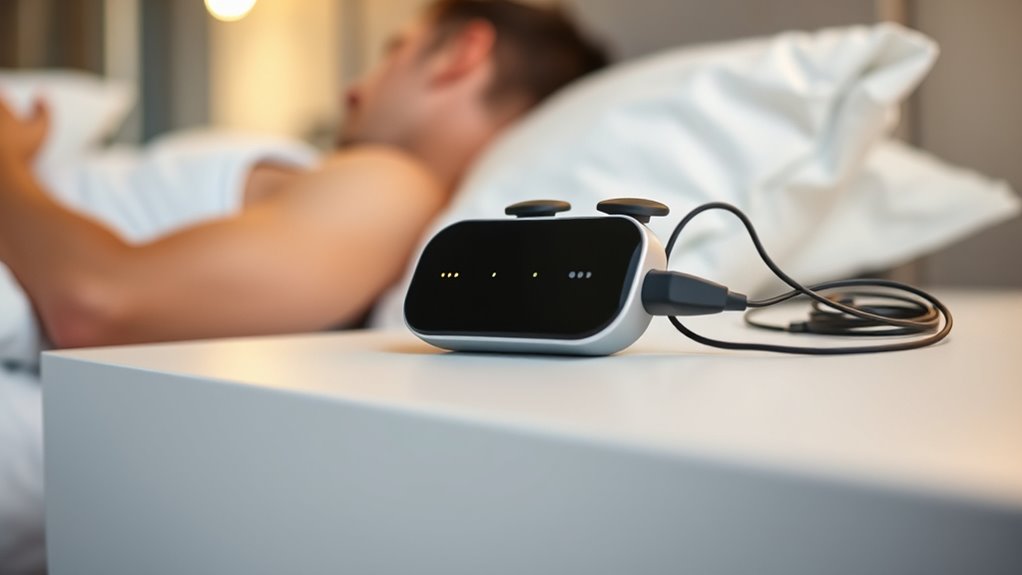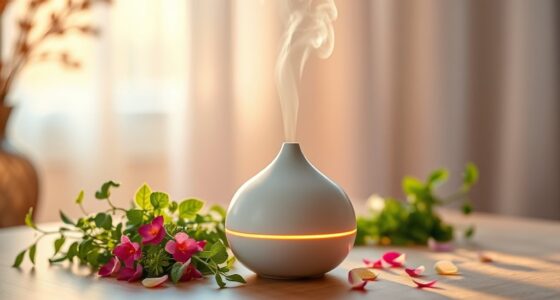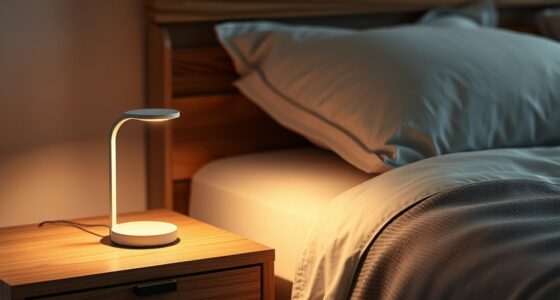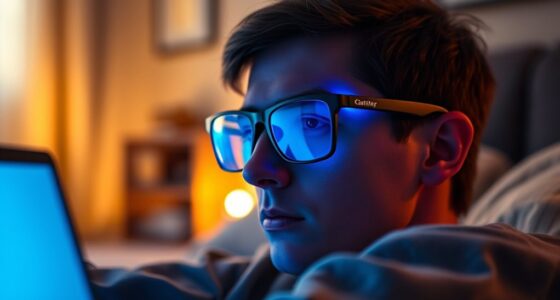Portable sleep monitors make it easy for you to track your sleep anywhere, thanks to their compact and lightweight design. They often sync seamlessly with your smartphone, encouraging consistent use and providing useful insights into your sleep patterns. However, their accuracy can vary depending on the device quality and external factors like movement. While they’re great for lifestyle tracking, they shouldn’t replace professional sleep studies. Keep exploring to discover more about how these devices can benefit you.
Key Takeaways
- Portable sleep monitors offer convenience and flexibility for tracking sleep in various environments.
- While accurate with advanced sensors, data quality can be affected by external factors like movement or placement.
- Their compact design makes them easy to wear or carry, but often limits battery life and feature set.
- They provide useful insights for improving sleep but are not substitutes for professional sleep studies.
- Consistent use over time can help identify patterns, but device accuracy varies depending on quality and usage.

Portable sleep monitors are compact devices that help you track your sleep patterns wherever you go. These gadgets are designed to fit seamlessly into your routine, providing valuable insights into your sleep quality without the need for bulky equipment. One of the main advantages of these devices is their device portability, which allows you to carry them easily on trips, to work, or even during everyday activities. This convenience means you can monitor your sleep in different environments and get a more all-encompassing picture of your sleep habits. However, while portability makes these monitors appealing, it also raises questions about sleep tracking accuracy. Since many portable sleep monitors rely on sensors that detect movement and heart rate, their accuracy can vary depending on the device’s quality and how you use it. Additionally, the convenience of remote monitoring aligns with the trend of remote work, making it easier to maintain a consistent sleep tracking routine despite a busy schedule.
When it comes to sleep tracking accuracy, some portable monitors perform quite well, especially those equipped with advanced sensors and algorithms. They can provide detailed data that includes sleep stages, duration, and interruptions, helping you identify patterns and potential issues. On the other hand, less sophisticated devices might offer only rough estimates, which could lead to misinterpretations or false alarms. If you’re serious about understanding your sleep, it’s crucial to choose a device with proven accuracy and reliable data collection. Keep in mind that no device is flawless, and external factors like movement during sleep, skin contact, or even the device’s placement can impact the data’s precision.
Device portability is another critical factor. These monitors are typically lightweight, often resembling a wristband, clip-on, or small pad, making them easy to wear or carry without discomfort. This portability encourages consistent use, which is essential for tracking patterns over time. Furthermore, many devices sync with your smartphone or computer, allowing you to view detailed reports and insights conveniently. The trade-off, however, is that smaller devices sometimes have limited battery life or fewer features compared to larger, more complex sleep tracking systems. Still, for most users, the convenience of portability outweighs these minor limitations.
Ultimately, portable sleep monitors offer a practical way to keep tabs on your sleep wherever life takes you. They excel in providing easy, on-the-go monitoring, but their accuracy can vary. To get the most out of your device, research models with good reviews for sleep tracking accuracy and ensure they fit comfortably into your routine. While they may not replace professional sleep studies, they are a helpful tool for gaining insight into your sleep health and making informed lifestyle adjustments. Embracing remote work and flexible routines can further support healthier sleep habits and overall well-being.
Frequently Asked Questions
How Accurate Are Portable Sleep Monitors Compared to Clinical Sleep Studies?
You want to know how accurate portable sleep monitors are compared to clinical sleep studies. While they provide a convenient accuracy comparison, they generally aren’t as precise as clinical validation. Portable devices can detect sleep patterns and disturbances, but they might miss subtle issues that a thorough sleep study catches. So, for a detailed diagnosis, a clinical sleep study remains the gold standard, though these monitors offer useful insights for ongoing monitoring.
Can Portable Sleep Monitors Diagnose Sleep Disorders Independently?
You can’t rely on portable sleep monitors to diagnose sleep disorders independently. They’re useful for monitoring sleep patterns at home, but they don’t replace professional evaluations. When setting up your device, verify your home setup is correct for accurate data collection. Also, consider data privacy concerns, as personal sleep data is stored and transmitted. Always consult a healthcare professional for a proper diagnosis and treatment plan.
Are Portable Sleep Monitors Suitable for Children or Only Adults?
Think of portable sleep monitors as tiny guardians watching over your child’s sleep. They’re generally designed for adults, but some models are suitable for children, emphasizing child safety and device durability. You should always check the manufacturer’s age recommendations and guarantee the device is sturdy enough to handle active little ones. Proper use and choosing the right monitor help protect your child’s wellbeing while providing reliable sleep insights.
How Long Does the Battery Last During Overnight Use?
You’re wondering how long the battery life lasts during overnight use. Typically, portable sleep monitors offer a battery life of around 8 to 12 hours, enough for a full night’s sleep. Charging duration varies but usually takes 1 to 2 hours to fully recharge. To guarantee your device works all night, check the specific model’s battery specifications and charge it fully before bedtime.
What Privacy Concerns Are Associated With Using Portable Sleep Monitors?
When you use portable sleep monitors, you should consider data privacy and data security concerns. These devices collect sensitive health information, which could be vulnerable if not properly protected. You might worry about unauthorized access or data breaches, so it’s important to choose monitors with strong encryption and clear privacy policies. Always read the terms, and be cautious about sharing your sleep data to protect your personal information.
Conclusion
So, next time you’re tempted to rely on that tiny gadget to track your sleep, remember: it’s probably just as accurate as your friend’s horoscope. Sure, it’s convenient and cool to wear, but don’t forget it’s not a magic wand for perfect sleep. Use it as a helpful guide, not a crystal ball. After all, if your sleep’s really that important, maybe just try sleeping instead of obsessing over data. Just saying.









